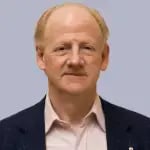JOHN RALSTON SAUL
.webp?width=1900&height=400&name=photo-accueil-site-pieds%20(1).webp)

JOHN RALSTON SAUL
John Ralston Saul is an award-winning essayist and novelist. A long-time champion of freedom of expression, he was elected President of PEN International in October 2009 until October 2015.
Saul has had a growing impact on political and economic thought in many countries. Declared a “prophet” by TIME magazine, he is included in the prestigious Utne Reader’s list of the world’s 100 leading thinkers and visionaries. His 14 works have been translated into 27 languages in 36 countries. Saul’s most recent essay is The Comeback published in October 2014 and translated into French by Daniel Poliquin in 2015 under the title Le Grand Retour.
Saul is perhaps best known for his philosophical trilogy – Voltaire’s Bastards: The Dictatorship of Reason in the West, The Doubter’s Companion: A Dictionary of Aggressive Common Sense and The Unconscious Civilization. This was followed by a meditation on the trilogy – On Equilibrium: Six Qualities of the New Humanism.
He is General Editor of the Penguin Extraordinary Canadians project, a series of 18 biographies that reinterprets important Canadian figures for a contemporary audience by pairing well-known Canadian writers with significant historical, political and artistic figures from 1850 onwards. His most recent work of non-fiction, a biography of Louis-Hippolyte LaFontaine and Robert Baldwin, is his own contribution to this series.
In 2005 in The Collapse of Globalism and the Reinvention of the World, Saul warned that, like it or not, globalism was already collapsing and that if we did not act quickly we would be caught in a crisis and limited to emergency reactions. The Collapse of Globalism was re-issued in 2009 with an updated epilogue that addresses the current crisis.
In his 2008 national bestseller, A Fair Country: Telling Truths about Canada, Saul argued that Canada is a métis nation, heavily influenced and shaped by aboriginal ideas: egalitarianism, a proper balance between individual and groups, and a penchant for negotiation over violence are all aboriginal values that Canada absorbed.
He has received many national and international awards for his writing, including: the Pablo Neruda Medal, South Korea’s Manhae Grand Prize for Literature and The Gutenberg Galaxy Award for Literature. The Unconscious Civilization won Canada’s Governor General’s Literary Award for Non-Fiction, as well as the Gordon Montador Award for Best Canadian Book on Social Issues. His Reflections of a Siamese Twin was chosen by Maclean’s magazine as one of the ten best non-fiction books of the twentieth century. His novel, The Paradise Eater, won Italy’s Premio Lettarario Internazionale. In 2015 he was awarded the World Prize of Humanism by the Ohrid Academy of Humanism in Macedonia.
He has published six novels, including The Birds of Prey, as well as The Field Trilogy, which deals with the crisis of modern power and its clash with the individual. It includes Baraka or The Lives, Fortunes and Sacred Honor of Anthony Smith, The Next Best Thing, and The Paradise Eater. His most recent work of fiction – the first in over fifteen years – is Dark Diversions, a picaresque novel in which he observes the life of modern nouveaux riches Americans.
President of Canadian PEN from 1990-1992 and an active member of Centre québécois du PEN international, he helped create the Canadian PEN Writers In Exile Network in 2004. He is a member of the Norway based Council of Writers and Experts of ICORN (International Cities of Refuge Network).
Saul is the Co-Chair of the Institute for Canadian Citizenship (ICC), a national charity promoting the inclusion of new citizens. He founded the ICC’s LaFontaine-Baldwin Symposium, a national lecture event that showcases leading Canadian and international thinkers and invites Canadians to join the national conversation on citizenship and the public good. He is also Founder and Honorary Chair of Le français pour l’avenir/French for the Future, an organization which advances the use of French among secondary school students, the patron of PLAN, a cutting edge organization serving people with disabilities.
He is a Companion of the Order of Canada, the Order of Ontario and a Chevalier in the Ordre des Arts et des Lettres of France. His 19 honourary degrees range from McGill University and l’Université du Québec (UQAM), both in Montréal, to Herzen State Pedagogical University in St. Petersburg, Russia.
Born in Ottawa, Saul studied at McGill University and King’s College, University of London, where he obtained his Ph.D. in 1972.
If you are interested in being Directors on our Board, you can contact us by filling out this form.